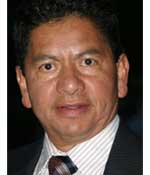Ernesto Marinero
Biography:
 Ernesto Marinero received his B.Sc. and Ph.D. degrees in Physics from Heriot-Watt University, Edinburgh, United Kingdom. His research experience has been gained through various appointments in Europe and the USA. This includes basic and applied research at the Max Planck Institute in Goettingen, Germany, Stanford University, and the IBM and Hitachi Research Centers in San Jose, California.
Ernesto Marinero received his B.Sc. and Ph.D. degrees in Physics from Heriot-Watt University, Edinburgh, United Kingdom. His research experience has been gained through various appointments in Europe and the USA. This includes basic and applied research at the Max Planck Institute in Goettingen, Germany, Stanford University, and the IBM and Hitachi Research Centers in San Jose, California.
His technical expertise includes Materials Science, Semiconductor Physics, Growth of Nanostructured Materials and Thin Films, Laser Physics and Picosecond Phenomena, Laser-Materials Processing, Atomic and Molecular Spectroscopy, Hydrogen Quantum Chemistry, Optoelectronics, Characterization and Metrology, Thin Film Corrosion and Reliability, Magnetic Materials and Magnetic Recording Technology, Phase-Change Storage and Nanoscale Sensor Device Physics and Fabrication. His work has been widely published in the scientific literature and utilized in IBM’s and Hitachi’s technology products. His original research is the subject of numerous US, Asian and European patents.
Marinero is currently at the Hitachi San Jose Research Center and his research focuses on two key areas: 1) synthesis of new nanostructured magnetic materials and 2) research on electron transport of mesoscopic devices based on semiconductor 2DEG heterostructures with particular emphasis on ballistic transport and quantum transport. He is actively involved in collaborative research programs with academic institutions in the USA, Mexico and the UK through joint research programs in nanoscience and nanotechnology.
Statement:
One of the key objectives of FIAP is to help the Society take advantage of the evolving opportunities in the practice and application of physics. As an elected FIAP officer, I intend to invest a significant amount of time to work directly with academia and both industrial and government laboratories to pursue this objective in the context of identifying and fostering the participation of physicists in developing the technologies that will drive the economy of the 21st century. In particular, the contributions that physicists can make in Nanoscience and Nanotechnology are pivotal to the successful development of new technologies and devices. I will use my long term industrial experience and participation in multi-disciplinary projects in said endeavor to identify realistic opportunities for the successful implementation of the physical sciences in solving applied problems. A second objective of my tenure, if elected, will be to enhance the collaboration of the physics community at the international level to take advantage of global resources and expertise to solve complex, multi-disciplinary problems.
